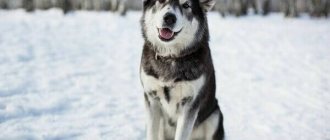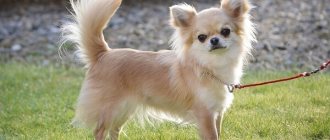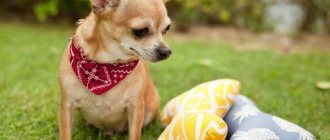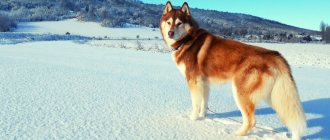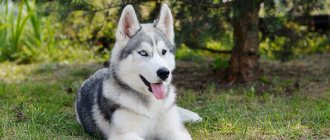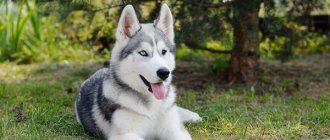To a person who is far from dog breeding, huskies and malamutes look almost like twins: both of these dogs seem equally large and fluffy to him.
But, despite some external similarities, as well as a common original purpose, the husky and malamute have quite a lot of differences.
The difference between these dogs becomes especially noticeable when they are side by side, for example, in the show ring.
And then even a non-specialist becomes clear that these are representatives of two different breeds.
A little about malamutes
Description and what they look like in the photo
The Alaskan Malamute is a fairly large northern sled dog of the aboriginal type, distinguished by a strong physique and well-developed muscles .
Its coat is two-layered, consisting of a soft undercoat and coarse, denser guard hair.
Colors vary from grayish to black, and reddish or sable coat color is also acceptable. At the same time, the Malamute necessarily has the so-called undercolor - lightening to white on the belly, chest, neck, head, hind legs and tail. Of the single-color colors, only white is considered acceptable.
Other characteristics of the appearance of Malamutes:
- The body of Malamutes is only slightly stretched: their body length should exceed the height at the withers by no more than 2 cm.
- The head is wide and quite massive, but at the same time commensurate with the body and paws.
- The limbs are strong and powerful, always parallel and well muscled.
- The tail is not too long, moderately pubescent and usually carried over the back in the form of a plume.
- Malamutes have medium-sized ears, erect, triangular. Set relatively wide and low, which gives the dog's muzzle a good-natured and calm expression.
- The eyes are small, almond-shaped, slightly slanted. Only brown eye color is allowed; blue iris or heterochromia are disqualifying defects.
When evaluating a dog at an exhibition, the proportionality of the build and the productivity of the gait are of greater importance than individual parameters.
Advantages and disadvantages
Pros:
- They are distinguished by strength and endurance.
- Smart and smart.
- Friendly to people.
- Affectionate and obedient.
- Loyal to children.
- They tolerate loneliness quite well: they do not howl when left alone in the house and do not cause damage to the interior.
- Beautiful and stately.
- Can be used as a sled dog or sport dog.
Minuses:
- They show aggression towards small animals.
- They have a tendency to dig up the earth.
- They shed heavily.
- They don't make very good watchmen.
- They need a lot of physical activity.
Character
The Alaskan Malamute is a friendly, loyal and affectionate dog . He treats all family members equally well and willingly looks after the children, patiently enduring all their pranks.
But at the same time, the Malamute does not like to be pestered too much: calm and friendly by nature, it can show dissatisfaction if it is teased or offended.
Outwardly, such a dog looks large and powerful, but due to its innate good nature and the good attitude developed over the centuries towards all people without exception, it is not suitable for the role of guard of a house or apartment..
Malamutes are strong and strong animals that, while usually obedient and friendly, can sometimes be stubborn and self-willed.
These dogs are characterized by intelligence and intelligence, thanks to which they were able to survive in the harsh climatic conditions of Alaska.
Origin
Siberian Husky (left) and Alaskan Malamute (right)
Huskies were developed in Siberia, and the breed was known before the 17th century. Northern tribes used the ancestors of huskies as sled dogs. In the 17th century, Russian scientists and travelers who began to explore Siberia were impressed by the phenomenon of a fluffy vehicle, which they described in their travel notes. But real popularity came to huskies in the late 19th and early 20th centuries.
At this time, the gold rush came to America (a gold mining boom in Alaska), and for the convenience of moving through snow and ice, it was decided to purchase these fast and hardy dogs in Siberia. There, in America, in 1934, the breed was officially recognized with the emergence of a clear standard.
Malamutes have lived in Alaska since time immemorial alongside the indigenous peoples. The breed got its name from one of the Eskimo tribes.
According to modern scientists, Malamutes are descendants of ancient dogs that accompanied people during the migration from Greenland to Asia. Researchers described these dogs back in the 19th century, emphasizing their exceptional endurance and frost resistance.
These qualities almost destroyed the breed, since during the gold rush, purebred dogs, due to their impressive size, began to be crossed with representatives of different breeds with good working characteristics.
But in 1905, the first nursery for breeding purebred Malamutes appeared in America, and in 1935 official registration took place and a standard was determined.
Briefly about huskies
Description
The Siberian Husky is a northern sled dog of medium height , fast and agile, in which endurance and running speed are successfully combined with harmony and some grace of physique .
Males of this breed look more courageous: they have stronger bones and better developed muscles. But more feminine and graceful females should also not appear too delicate or weak.
Regardless of gender, the husky has a compact body with well-developed and strong muscles.:
- The head should not be coarse and massive, nor too light. The transition to a moderately wide muzzle is well defined, but not abrupt.
- The ears are medium in size, triangular in shape, erect and set high.
- The eyes are almond-shaped, moderately widely spaced, blue or brown. Heterochromia is also allowed.
- The limbs are moderately wide, straight and parallel, with well-developed muscles.
- The tail resembles a fox's in shape and size. When calm, it is lowered and straightened; when alert, it rises above the back and is carried in the shape of a sickle.
- The coat consists of a soft and warm undercoat, as well as a short, smooth-lying awn.
Huskies can have any color, from white to black , and often have a light mask of a characteristic shape on the head .
Show huskies are somewhat different from working and sporting dogs: they look more impressive, but at the same time, due to their shortened muzzle, they are not so hardy.
Advantages and disadvantages
Pros:
- They are smart and know how to make their own decisions.
- Beautiful and charming: huskies have expressive eyes and rich facial expressions.
- They do not show aggression towards strangers.
- They treat children well.
- They love to follow their owner everywhere.
Minuses:
- Not suitable for protection.
- They love to dig the ground and create tunnels.
- Wouldn't mind hunting birds or, for example, cats.
- They can be stubborn and self-willed.
- Prone to escape.
- Left alone, they often howl out of boredom, chew furniture or tear off wallpaper.
Huskies love to be busy and it doesn’t matter to them whether it’s a show career, sports, or just long walks in the company of their beloved owner.
Character
Huskies are friendly and affectionate, but at the same time somewhat independent . These dogs are vigilant and careful, however, due to their lack of a protective instinct, they are too trusting and make poor watchdogs.
This dog is excellent at adapting to different conditions, he is neat and clean.
Self-sufficient and independent, reminiscent of a cat in character, he has a tendency to run away and walk on his own, and therefore needs careful supervision, especially if he lives in a rural area.
The Husky is best suited for sports and carrying light loads than for any other work.
What are the differences?
Malamutes are large and broad-boned, they look more massive than the fit and lighter Huskies.
The height at the withers of a husky is 52-55 cm at the withers with a weight of 20-30 kg, while for a malamute it is 60-65 cm with a body weight of 32-43 kg.
The Malamute's head is noticeably larger, more massive and wider.
Its ears are slightly rounded at the ends and set wide apart, whereas the Husky's ears are pointed and set quite close.
The Malamute's eyes are almond-shaped, with a friendly and calm expression . Husky eyes are medium in size, with slightly raised corners, and their gaze is attentive, and sometimes even stern.
NOTE!
If in a husky both blue and dark eyes and even heterochromia are considered acceptable, then in a malamute the eyes should only be brown.
The Malamute's nose is larger in size and usually black. A husky's nose is smaller and may have darker pigmentation on the sides than in the center.
The Malamute's tail is carried at the level of the back and looks like a plume . A husky's tail hangs down when at rest and only when it is interested it rises above its back in the shape of a sickle.
In addition, the Malamute has strong and powerful paws, while the Husky looks taller and its paws are not too large in size.
The color of the Malamute is most often black or grayish, although it can be red, sable with undergrowth, and pure white. A husky's coat color can be any color.
The Malamute's coat is longer, but coarser, while the Husky's is shorter, softer and smoother..
By nature, the Malamute is calm and balanced, while the Husky is temperamental, cunning and stubborn. And, if strength and power are felt in the movements of the Malamute, then the gait of the Husky is fast and energetic.
Huskies have a habit of howling, while Malamutes do this extremely rarely..
Distinctive features
The main features of the Alaskan Malamute:
- Size and weight . The cables can grow up to 64.5 cm and the weight can reach 40 kg. Smaller females – up to 59 and 39 kg.
- The head is large, but proportional to the body. The muzzle is voluminous, not elongated and not pointed.
- The eyes are slanted and brown. It is very rare to find a Malamute with blue eyes.
- The ears are triangular in shape, set wide apart and slightly rounded at the tips.
- bite . The teeth are strong and sharp.
- Nose is black. The exception is representatives of the red color.
- The neck is strong, slightly arched.
- The legs are very strong and muscular. The hind ones are thicker than the front ones.
- The body is not short, proportional to the body. The sternum is well developed. The back is straight, the croup is slightly sloping. A strong and muscular loin, but it greatly lengthens the back, which is a disadvantage of the breed.
- The tail is thick, medium set, slightly curled, but does not reach the back.
- The coat is very hard, with a very thick undercoat underneath.
- Color: black and white, seal and white, gray and white, silver and white, white, red and white, sable. The undercoat is always white or cream, only the color of the guard varies.
- Muzzle markings "headphones" connecting at the center of the forehead, dark spots under the eyes extending to the ears, a "bar" running the entire length of the muzzle, a white stripe or "star" between the ears, dark spots around the eyes.
How are they similar?
Both dogs were bred in the North, and therefore both Huskies and Malamutes are perfectly adapted to harsh climatic conditions and are particularly resilient and frost-resistant.
Over centuries of close interaction with people, representatives of both breeds have learned to trust unconditionally and have a habit of becoming strongly attached to their owners..
Both of these dogs are smart and can make their own decisions when necessary.
They both have triangular erect ears, a long fluffy tail and a two-layer coat, which is most often grayish or reddish-brown, which is mainly due to the external similarity of these breeds.
Both Malamutes and Huskies were bred as sled dogs, but if the duty of the former was to transport heavy loads, then Huskies were valued for their speed in delivering goods..
Which breed is best suited for living in an apartment?
The Malamute has a calmer disposition and does not tend to misbehave when left alone all day.
Huskies can also be kept in the city, but it must be taken into account that these dogs are prone to mischief out of boredom and if the owner does not want to return home to find chewed furniture or wallpaper torn from the walls, he should take care of purchasing a cage for the pet.
Huskies often howl when left alone, and therefore the owner will have to make a lot of effort to wean them from this bad habit..
Expert opinion
Kozhevin Semyon Kirillovich
Expert dog handler.
“Malamute and husky may seem the same only at first glance. Despite the fact that both of these dogs are northern sled breeds, they have much more differences than similarities. Malamutes are calmer and even phlegmatic, while huskies are emotional and very active. It is impossible to immediately say which of them is better and which one should be started. The future owner, when choosing a pet breed, must decide who is more suitable for him in temperament and character: a calm malamute or a temperamental husky.”
Visual differences between dogs
Look at these photos, we are sure that after this there will be no trace of questions left about the difference between the Alaskan Malamute and the Siberian Husky:
Husky
Malamute
Husky
Malamute
And these are the puppies:
Who is easier to maintain and care for?
Both Huskies and Malamutes require occasional brushing and infrequent bathing. They will also need to have their eyes and ears cleaned from time to time, and their nails trimmed if necessary.
It should be taken into account that representatives of both breeds shed heavily, and therefore during the shedding season the pet will have to be combed not a couple of times a week, as usual, but daily.
Attitude towards children and pets
Huskies have an active and playful disposition; they are better suited for playing with older children. Malamutes treat children quite well, but rather in a protective manner than in a friendly manner.
As for the attitude towards other pets, the Malamute, being a natural leader, strives to dominate other dogs.
In addition, he may not be too kind to cats, rodents and other smaller pets.
However, a husky, due to its hunting instincts, may try to hunt other domestic animals or birds.
Whichever of these two breeds the dog is, in any case it needs early socialization and proper upbringing.
Comparison by other criteria
Life expectancy and health
The life expectancy of Huskies is, on average, 12-14 years, and for Malamutes it reaches 13-15 years.
Both breeds enjoy good health, but may be susceptible to eye problems, musculoskeletal disorders, and diabetes..
Huskies that participate in sports may also develop respiratory problems.
Due to the fact that Malamutes and Huskies have such a good appetite and are always ready to eat at any opportunity, they are susceptible to obesity and related diseases.
Aggressiveness towards strangers
Neither malamutes nor huskies have it naturally.
Obedience
The Malamute is more obedient and less likely to be stubborn and willful than the Husky..
On the other hand, he needs a strong and self-confident owner, since otherwise he simply will not be able to prove to the dog his physical and moral superiority.
Appearance
If you put representatives of both breeds side by side, it will not be difficult to distinguish individuals of one variety from the other. External differences between Malamute and Husky include:
- size;
- tail;
- wool quality;
- color;
- head shape;
- facial expression;
- eyes.
Dimensions
The Husky is noticeably smaller in size than the Malamute. This dog has a natural sprinter's build, as well as some traits that are typical of a hound. It is characterized by:
- mobility;
- good reaction;
- grace;
- flexibility.
Unlike the Siberian Husky, the Alaskan Malamute has a large skeleton, which makes it overweight. Such a dog gives the impression of a rough tractor. She is squat. Its paws are short, powerful, with wide, rough pads at the ends.
Comparative parameters of the dimensions of dogs of both breeds are given in the table below.
| Breed / Parameters (height at withers (height) and weight) | Males | Females |
| Husky |
|
|
| Malamutes |
|
|
As can be seen from the table, huskies are noticeably inferior to malamutes in height and even more so in weight, which in the latter can be twice as large.
https://youtube.com/watch?v=OooxSllc_y0
Tail and its features
The Siberian's tail is similar in appearance to that of a fox - just as voluminous and fluffy. Contrary to popular belief, a husky's tail is not curled. This shape is typical for the husky. The husky has a maximum possible tail curl - crescent-shaped. Usually they hold it vertically (always in this position when moving), but they can also tilt it slightly towards the back. When taking a stance, the “Siberians” lower their tail down.
In Malamutes, this limb resembles a fan. This is due to the fact that its coat is longer and fluffier than that of a husky. When standing, Alaskans simply place their tail on their back, and when moving, they keep it slightly raised above their back.
Coat and color
If you compare the quality of the coat, then the husky’s is much better. Their hairs:
- have an average length;
- are distinguished by softness;
- don't puff up.
In terms of color, Siberians come in any color - from white to black.
As for Malamutes, their coat is hard. The hairs stick out in different directions. In terms of possible color options, these dogs are in no way inferior to huskies. Their fur comes in the following colors:
- from light gray to black;
- from light beige to rich brown;
- red;
- coffee.
White underparts are required for purebred Malamutes. That is, the fur on the paws, belly and chest, regardless of the color of the fur on the back, these dogs are always white.
Based on their color, Malamutes are divided into two within-breed categories - Kotzebue and M'Lut. The latter includes individuals of the wolf color. Kotzebue Malamutes come in a variety of colors. It is worth noting that dogs of these breeds have similar colors. But this does not make them so similar to each other that they can be confused.
Head, eyes and muzzle
Compared to Malamutes, Huskies have thin, “withered” features. The muzzle of the Siberian dog is narrow and of medium size. The Alaskan's head, on the contrary, has a three-dimensional shape. Malamutes have massive jaws and cheekbones.
The ears of both breeds are triangular and erect (most of the time). They are very similar among representatives of the species, but still not the same - the ears of “Alaskans” are more rounded, while those of Huskies are noticeably sharper.
Dogs' eyes are also quite similar. In dogs of both one and another breed they:
- medium size;
- almond-shaped;
- they mow a little;
- partly with an asymmetrical arrangement.
As a distinctive feature, eye color is much more important than their shape and other features. Malamutes are only allowed dark irises. The blue-eyed "Alaskan" is considered defective. A husky can have any eye color. And individuals with a blue iris, as well as those with heterochromia, are held in special esteem. Dogs with such external characteristics are the most in demand, the demand for them never subsides.
By their look and facial expression, Malamutes seem much kinder than Huskies. This impression is due to the color, which is characteristic of “Siberians”. It is he who gives their face a grumpy and at the same time cunningly mischievous expression. In addition, the husky's gaze seems angry and constantly wary. It is worth emphasizing that such an impression is deceptive. By their nature, huskies do not correspond to him.
The Malamute's muzzle and its expression turn this dog into a good-natured glutton. The dog's facial expressions are pleasant and funny. A kind, playful expression never leaves his face, his gaze is direct and open. The appearance of the Malamute is more than attractive. And this external good nature is by no means deceptive.
Which breed should you choose?
Huskies can be recommended as a pet to active people involved in sports or to families with older children: such a dog will become a good companion while jogging, as well as an excellent playmate.
If the future owner does not like noise and fuss, then it is better for him to choose a calmer and more balanced Malamute.
When choosing between representatives of these two breeds, you need to remember that both huskies and malamutes are sled dogs that require a lot of physical activity.
Preferences
Who is better to take - a malamute or a husky?
When choosing between them, you need to remember that these are sled dogs. You will have to walk with them a lot and pay attention to physical activity. Huskies without energy return generally become real destroyers
Walking and playing together with a Malamute strengthens his respect for his owner.
An adult dog eats little - he needs about 500 g of meat per day, you can give cereals, fruits, and vegetables. But the Alaskan dog is very hungry for food. No matter what you eat, she will sit next to you and watch until she gets a piece. Siberians are more relaxed about treats and food.
We invite you to familiarize yourself with: Horse trailer for transporting livestock and large animals
Both breeds are not suitable for inexperienced dog owners. In order for dogs to obey you, you need to invest a lot of time and effort into their upbringing. Undesirable skills acquired through illiterate learning cannot be corrected.

